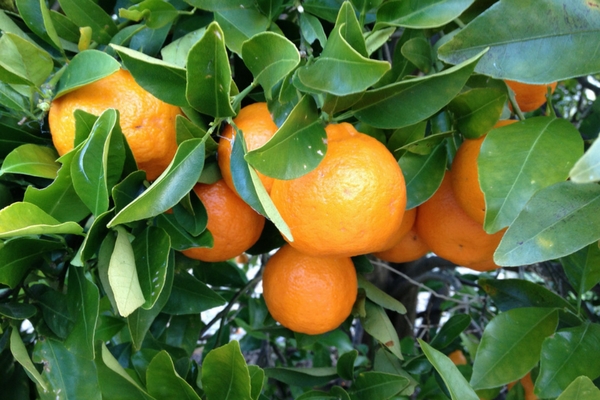It is not by chance that mandarins ripen in winter. They are a great example of how seasonal foods best support our health and wellbeing. So what gives a mandarin its winter magic?
Western and Eastern medicine agree that no one food alone provides all the nourishment required for our immune system during winter. But mandarins have special characteristics to help prevent illness, and support a quick recover from cold and damp conditions.
Firstly, lets explore the origins of the mandarin.
Origins of the mandarin
The mandarin is a native of southeast Asia and the Philippines. It possibly originated in China. The mandarin is also known as a tangerine, but mandarin is the original name. When crossed with a grapefruit, it becomes a tangelo.
The fruit is now commercially grown worldwide, including Australia, China, France, South Africa, South America, Spain and the USA. The main crops in Australia are in Western Australia, Queensland and northwest Victoria. They all harvest fruit during winter. There are several varieties of mandarin grown in Australia and you can read more about these here.
We are very fortunate to have mandarin, cumquat, orange, lime and lemon trees in our garden. You too may enjoy the visual, aromatic and nutritional benefits of growing citrus trees. Enquire at your local nursery about varieties that grow in pots and those suitable for your backyard space. If this is not practical for you, then buy from local farmers markets when the citrus fruits a plentiful.
Choosing your mandarin
- Choose a fruit with thin, fairly loose orange skin
- The fruit should feel heavy for its size
- Store at room temp for up to a week after purchase, then refrigerate
Mandarin health benefits
Western Medicine
From a nutritional perspective, mandarins are an excellent source of phytochemicals, vitamin C, carbohydrate and fibre. They also provide a good source of folate and potassium.
The nutrient with the most research related to winter illnesses, is vitamin C. The body cannot metabolise vitamin C, so we need to eat foods that provide this vitamin.
Interest in vitamin C and infections was triggered by the observation that levels of vitamin C in plasma and leukocytes—disease fighting blood cells—decrease during infections and stress. This means we have less resistance to pathogens—disease-contributing components.
Research, linking vitamin C with respiratory infections and the common cold, has involved supplementation with vitamin C, rather than foods. Supplementation with both vitamin C and zinc has been shown to reduce the length of a respiratory infection, but not a common cold.
Vitamin C supplementation has only been found to be of benefit in preventing the common cold in people who live in very cold environments, or exercise at extreme levels. Intense exercise produces fat breakdown products that damage muscle tissue. Vitamin C, as well as other antioxidant supplements, reduces the level of these damaging products.
Supplementation of vitamin C and other nutrients is recommended with the advice of your of healthcare practitioner. The incorrect dosage of supplements may not assist your health, and at worse may contribute to illness.
A high intake of fresh fruit and vegetables is required to provide vitamin C and other nutrients and phytochemicals that boost our immune system. Science recognises that whole foods work in synergy to promote wellness and prevent a range of conditions and diseases, such as excess weight, diabetes and heart disease. These same foods are essential for our mental health too.
Eastern Medicine
Traditional Chinese Medicine describes the mandarin as cool, sweet and sour. Its main benefits are supporting our digestive and respiratory systems. Mandarins assist in strengthening our digestive system, improving poor appetite, reducing excess heat in the body—from exercise, hot weather or illness, such as fever—and making the chest and diaphragm more supple for breathing and resolving phlegm.
Mandarin peel is more commonly used as a medicine. Its properties are warm, sour, bitter and aromatic. These properties also support the digestive and respiratory systems by stimulating the Qi, which may be translated as meaning our metabolism. Mandarin peel is used to resolve excess mucus, loosen the diaphragm and dry up excess dampness in the chest and a cough.
Ayurveda describes the use of the mandarin and its peel similarly to Traditional Chinese Medicine. Mandarins and other citrus fruits are recognised for their properties of resolving excess phlegm and mucus. The fruit provides moisture, where as the peel assists with the drying up of excess dampness.
Citrus fruits can be included in an anti-kapha, or excess kapha, diet. This type of eating pattern is recommended during winter and early spring. The main aim of this approach is to reduce excess phlegm and mucus.
Ways to enjoy mandarins
- Eaten fresh with or without peel
- In a fruit or garden salad
- Preserved through bottling
- Used for marmalade and relish
- Juice, pulp and peel can be used in baking
- Juice and peel add zest and flavour to salad dressings and sauces
- Grated peel adds additional flavour to salads, burgers, rice, cous cous and quionea dishes, curries, stir-fry meals and custards
When eating mandarins and other citrus fruits, don’t discard the peel. The peel has higher concentrations of fibre, vitamins and phytonutrients than the flesh of the fruit. The peel also provides an alternative flavouring option to salt and sugar and can be added to savoury and sweet dishes. Enjoy mandarins and other citrus fruits in winter and early spring.
For more practical tips on eating with the seasons, check out the Eating for You book.
